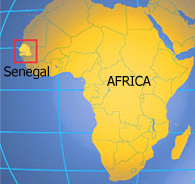Source: International Gay and Lesbian Human Rights Commission
On December 19, 2008, police officers raided the apartment of Mr. Diadji Diouf, an important leader in the Senegalese lesbian, gay, bisexual and transgender (LGBT) community, and arrested him and seven other men. Mr Diouf, who heads AIDES Senegal, an organization providing HIV prevention services to men who have sex with men (MSM), and his guests were taken to the SICAP Mbao police station where they were detained until December 24 before being transferred to the Maison D'arrкt et de dйtention de Rebeuss.

Under Article 3.913 of the Senegalese penal code, homosexual acts are punishable by imprisonment of between one and five years and a fine of 100,000 (US$200) to 1,500,000 (US$3,000) CFA francs.
In February 2008, ten men and one woman were arrested in Dakar after a popular local magazine published photographs of a marriage ceremony between two Senegalese men. The publicity and arrests created tremendous public animosity toward LGBT people in Senegal. Statements such as "killing a homosexual is not a sin" and "they should all be well and truly eliminated from the face of the Earth!" appeared on websites. Many gay men and lesbians were attacked by mobs or driven from their homes. IGLHRC coordinated financial assistance for LGBT defenders and others at risk, and led an advocacy campaign demanding the detainees' release.
In the current case, IGLHRC is deeply concerned by what appears to be a violation of: a) the right to a free and fair trial, b) the right to privacy, and c) the right to freedom from discrimination. IGLHRC is working with local and international partners to find more information about the case and explore options for action.
